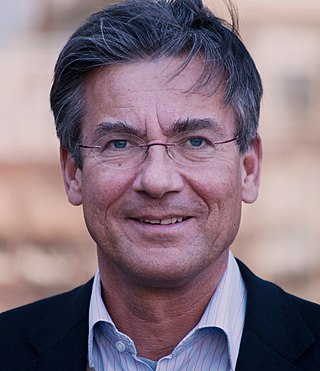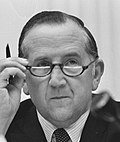
The politics of the Netherlands take place within the framework of a parliamentary representative democracy. A constitutional monarchy, the country is organised as a decentralised unitary state. The Netherlands can be described as a consociational state. Dutch politics and governance are characterised by a common striving for broad consensus on important issues, within both of the political community and society as a whole.

The Anti-Revolutionary Party was a Protestant conservative and Christian democratic political party in the Netherlands. The party was founded in 1879 by Abraham Kuyper, a neo-Calvinist theologian and minister. In 1980 the party merged with the Catholic People's Party (KVP) and the Christian Historical Union (CHU) to form the Christian Democratic Appeal (CDA).

The Christian National Trade Union Federation is a federation of trade unions of the Netherlands.

The Federation of Dutch Trade Unions is a national trade union centre in the Netherlands. The FNV is a significant player in the field of work and income. The trade union consists of a central federation, complemented by several sectoral unions representing specific professional groups and sectors. The FNV aims to safeguard the interests of employees, promote fair labor conditions, and protect workers' rights at the national level.

The Free-thinking Democratic League was a progressive liberal political party in the Netherlands. Established in 1901, it played a relatively large role in Dutch politics, supplying one Prime Minister, Wim Schermerhorn. The League is a predecessor of two of the major Dutch political parties, the conservative liberal People's Party for Freedom and Democracy (VVD) and the social democratic Labour Party (PvdA). The social liberal Democrats 66 also claims that it and the VDB are ideologically connected.
The Freedom Party was a short-lived conservative-liberal political party in the Netherlands active from 1946 to 1948. The PvdV was the successor of the Liberal State Party and a predecessor of the modern-day People's Party for Freedom and Democracy (VVD).
The polder model is a method of consensus decision-making, based on the Dutch version of consensus-based economic and social policymaking in the 1980s and 1990s. It gets its name from the Dutch word (polder) for tracts of land enclosed by dikes.

The Christian Historical Union was a Protestant Christian democratic political party in the Netherlands. The CHU is one of the predecessors of the Christian Democratic Appeal (CDA), into which it merged in September 1980.

The Reformatory Political Federation was a minor Protestant Christian political party in the Netherlands.
Bert Doorn is a Dutch politician and Member of the European Parliament (MEP). He is a member of the Christian Democratic Appeal, which is part of the European People's Party, and sits on the European Parliament's Committee on Legal Affairs and its Committee on the Internal Market and Consumer Protection.

The General League of Roman Catholic Electoral Associations, informally called the General League, was a Catholic political party in the Netherlands. It existed from 1904 to 1926, when it was succeeded by the Roman Catholic State Party. It is one of the ancestors of today's Christian Democratic Appeal.

The Social Democratic Workers' Party was a Dutch socialist political party existing from 1894 to 1946, and a predecessor of the social democratic Labour Party.
The Liberal State Party, "the Freedom League", was a conservative liberal political party in the Netherlands from 1921 to 1948. It is historically linked to the People's Party for Freedom and Democracy (VVD), a major Dutch political party.

The Social and Economic Council is a major economic advisory council to the cabinet of the Netherlands. Formally it heads a system of sector-based regulatory organisations. It represents the social partners trade unions and employers' organisations. It forms the core organisation of the corporatist and social market economy known as the polder model and the main platform for social dialogue.

Maxime Jacques Marcel Verhagen is a retired Dutch politician of the Christian Democratic Appeal (CDA) party and historian.

Gerritje "Gerda" Verburg is a Dutch politician and diplomat of the Christian Democratic Appeal (CDA) party and trade union leader

Catharina Pieternella "Ella" Vogelaar was a Dutch politician of the Labour Party (PvdA) and trade union leader.

Leendert Cornelis "Elco" Brinkman is a retired Dutch politician and businessman who served as Minister of Welfare, Health and Culture from 1982 to 1989 and Leader of the Christian Democratic Appeal (CDA) in 1994.
Pillarisation is the vertical separation of citizens into groups by religion and associated political beliefs. These societies were divided into two or more groups known as pillars. The best-known examples of this have historically occurred in the Netherlands and Belgium.



















